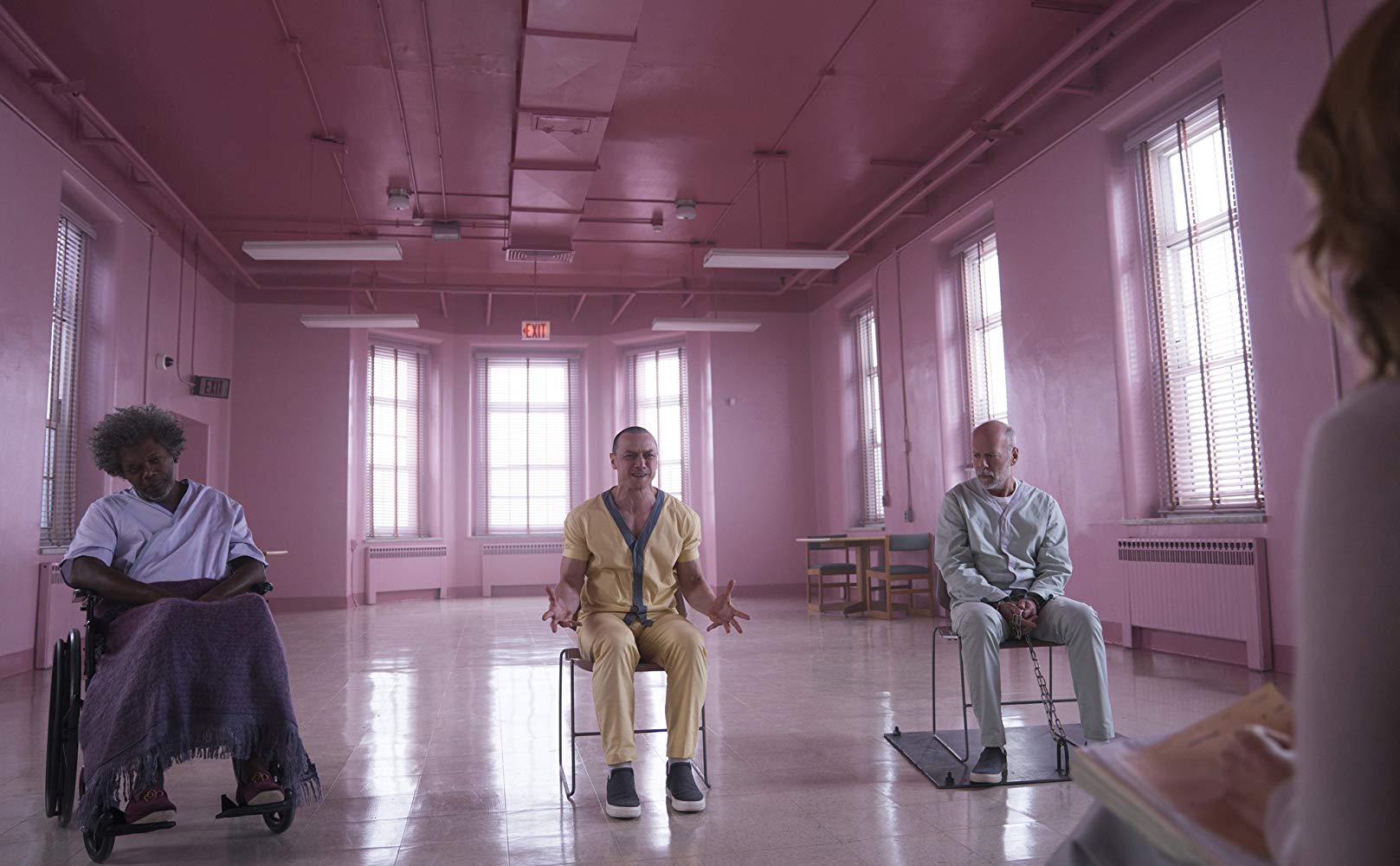It is safe to say that we’re living in the superhero movie era. They have taken over the box-office, the celebrity realm, and even the critical world: at the Academy Awards this year, Avengers’ Infinity War was nominated for Best Special Effects, Incredibles 2 snatched a Best Animated Picture nomination, and Black Panther made history as a Best Picture nominee. Most importantly, our contemporary superheroes have never been more vulnerable. Iron Man gets panic attacks. Star-Lord has daddy issues. In a time as politically complex as ours, there is something appealing in seeing the humanity behind our heroes. M. Night Shyamalan’s new thriller Glass should have been an important, exciting addition to the theme of superheroes who are as human as they are super. But instead, this one is an absolute trainwreck..
Glass is the final installation of Shyamalan’s superhero trilogy, which consists of Unbreakable (2000) and Split (2016). The sequel’s addition was a surprise twist at the end of Split, when it was revealed that the multi-personality serial killer Kevin Wendell Crumb (James McAvoy) existed in the same universe as David Dunn (Bruce Willis), who plays Philadelphia hero ‘The Overseer.’ As stated at the opening message of the pre-release screening,Glass is truly a project that “took 19 years to make.”
So, surely, somewhere along those 19 years, Shyamalan would’ve figured out a way to make Glass less of a disaster.
Glass takes place in the aftermath of Split—three weeks after Kevin has been nicknamed “The Horde.” The film opens with David and his son, Joseph, teaming up to save a group of cheerleaders that Kevin had abducted. The audience witnesses David’s super strength and powers of extrasensory perception:he brushes up against Kevin and encounters a vision of him with the cheerleaders that helps David to find their location. A fight breaks out between David and Kevin’s “Beast” persona, which is characterised by aggression and superhuman abilities. Their conflict spills onto the streets and they are sent to Raven Hill Memorial Hospital. At the institution, the duo encounter David’s archenemy Elijah Price (Samuel L Jackson), otherwise known as “Mr Glass,” and Dr Ellie Staple (Sarah Paulson).
While they are stellar actors, Willis and Jackson give a lackluster performances and are, more importantly, prevented from giving better ones due to poor writing. Paulson’s character is spineless and irritating. The screenplay is bland and uninspiring. For a superhero film, the action scenes themselves are textureless, the characters’ physical movements are weak and surprisingly uniformed. While it is admirable that Shyamalan wanted to create the “first truly grounded comic book movie,” he has instead created a movie so grounded in reality that it loses all interest. Shyamalan fails to create magic, or even a sense of energy, in the final showdown in the hospital parking lot.
The side-trio that accompanies the film’s main characters are equally as unconvincing. Glass brings back Casey Cook (Anya Taylor-Joy), the teenage girl whom Kevin lets go in Split after finding out that they both shared a history of abuse. She has developed a severe case of stockholm syndrome, and Shyamalan brings in a ‘Beauty and the Beast’ element that, literally, is as problematic as it is unfeasible. In the age of #MeToo, Hollywood can do better than setting up a high school student with her kidnapper. In the age of #MeToo, Hollywood has to do better. Spencer Treat Clark plays David’s son Joseph, a gangly kid who idolises his father and sees him as a real-life superhero, and Charlayne Woodard is Mrs. Price, Elijah’s mother who will do anything for her son. The family dynamic is fascinating, but the three characters fail to work well together and end up resembling a mismatched jigsaw puzzle.
The only redeeming factor of Glass is James McAvoy’s performance as Kevin. Split was a commercial success for a reason. He switches effortlessly between 24 personas—from uptight “Patricia”, to nine-year old “Hedwig,” to disturbed “Dennis”—in a way that takes your breath away. Glass is McAvoy’s movie. The scenes where his ‘true’ personality comes out—the moments when he is only Kevin Wendell Crumb—are heartbreaking and sincere. The movie gave McAvoy plenty of opportunities to show off his acting flair and it is a shame it failed to do so for Jackson and Willis alike.
Glass is an unsatisfying conclusion to a trilogy that failed to make sense in the first place. Boring, lifeless, and dry, the film revolves around a convoluted plot that fails to bring any energy to such an exciting concept. Ultimately, it’s implications of the relationship between corporations and superheroes, as well as the dynamic between being super and being human, will reach farther than the film ever will.





